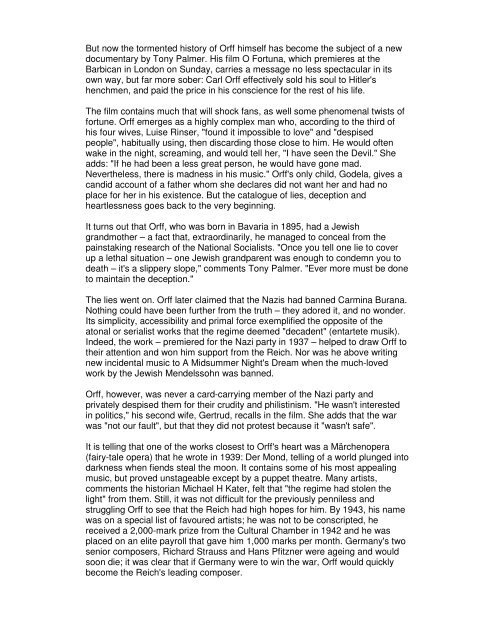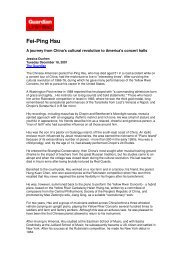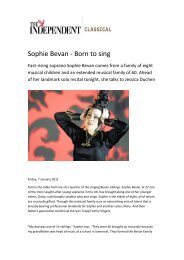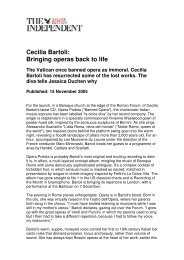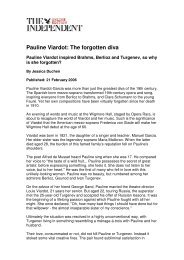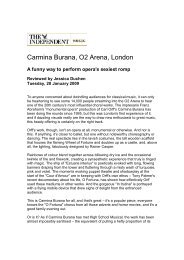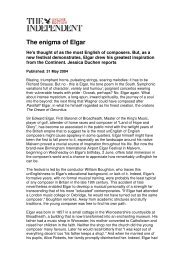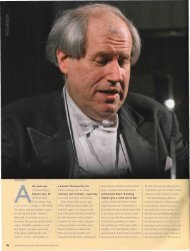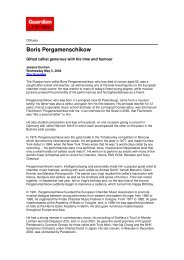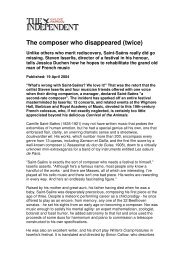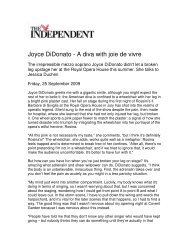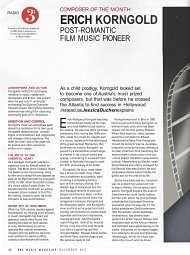Dark heart of a masterpiece: Carmina Burana's ... - Jessica Duchen
Dark heart of a masterpiece: Carmina Burana's ... - Jessica Duchen
Dark heart of a masterpiece: Carmina Burana's ... - Jessica Duchen
Create successful ePaper yourself
Turn your PDF publications into a flip-book with our unique Google optimized e-Paper software.
But now the tormented history <strong>of</strong> Orff himself has become the subject <strong>of</strong> a new<br />
documentary by Tony Palmer. His film O Fortuna, which premieres at the<br />
Barbican in London on Sunday, carries a message no less spectacular in its<br />
own way, but far more sober: Carl Orff effectively sold his soul to Hitler's<br />
henchmen, and paid the price in his conscience for the rest <strong>of</strong> his life.<br />
The film contains much that will shock fans, as well some phenomenal twists <strong>of</strong><br />
fortune. Orff emerges as a highly complex man who, according to the third <strong>of</strong><br />
his four wives, Luise Rinser, "found it impossible to love" and "despised<br />
people", habitually using, then discarding those close to him. He would <strong>of</strong>ten<br />
wake in the night, screaming, and would tell her, "I have seen the Devil." She<br />
adds: "If he had been a less great person, he would have gone mad.<br />
Nevertheless, there is madness in his music." Orff's only child, Godela, gives a<br />
candid account <strong>of</strong> a father whom she declares did not want her and had no<br />
place for her in his existence. But the catalogue <strong>of</strong> lies, deception and<br />
<strong>heart</strong>lessness goes back to the very beginning.<br />
It turns out that Orff, who was born in Bavaria in 1895, had a Jewish<br />
grandmother – a fact that, extraordinarily, he managed to conceal from the<br />
painstaking research <strong>of</strong> the National Socialists. "Once you tell one lie to cover<br />
up a lethal situation – one Jewish grandparent was enough to condemn you to<br />
death – it's a slippery slope," comments Tony Palmer. "Ever more must be done<br />
to maintain the deception."<br />
The lies went on. Orff later claimed that the Nazis had banned <strong>Carmina</strong> Burana.<br />
Nothing could have been further from the truth – they adored it, and no wonder.<br />
Its simplicity, accessibility and primal force exemplified the opposite <strong>of</strong> the<br />
atonal or serialist works that the regime deemed "decadent" (entartete musik).<br />
Indeed, the work – premiered for the Nazi party in 1937 – helped to draw Orff to<br />
their attention and won him support from the Reich. Nor was he above writing<br />
new incidental music to A Midsummer Night's Dream when the much-loved<br />
work by the Jewish Mendelssohn was banned.<br />
Orff, however, was never a card-carrying member <strong>of</strong> the Nazi party and<br />
privately despised them for their crudity and philistinism. "He wasn't interested<br />
in politics," his second wife, Gertrud, recalls in the film. She adds that the war<br />
was "not our fault", but that they did not protest because it "wasn't safe".<br />
It is telling that one <strong>of</strong> the works closest to Orff's <strong>heart</strong> was a Märchenopera<br />
(fairy-tale opera) that he wrote in 1939: Der Mond, telling <strong>of</strong> a world plunged into<br />
darkness when fiends steal the moon. It contains some <strong>of</strong> his most appealing<br />
music, but proved unstageable except by a puppet theatre. Many artists,<br />
comments the historian Michael H Kater, felt that "the regime had stolen the<br />
light" from them. Still, it was not difficult for the previously penniless and<br />
struggling Orff to see that the Reich had high hopes for him. By 1943, his name<br />
was on a special list <strong>of</strong> favoured artists; he was not to be conscripted, he<br />
received a 2,000-mark prize from the Cultural Chamber in 1942 and he was<br />
placed on an elite payroll that gave him 1,000 marks per month. Germany's two<br />
senior composers, Richard Strauss and Hans Pfitzner were ageing and would<br />
soon die; it was clear that if Germany were to win the war, Orff would quickly<br />
become the Reich's leading composer.


